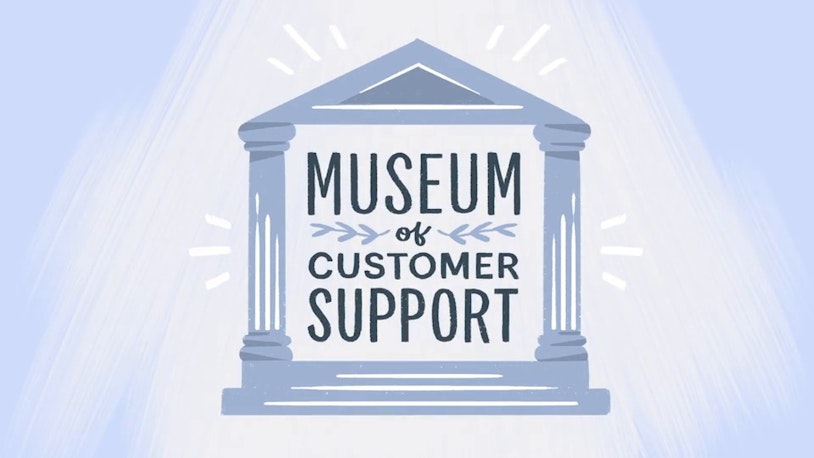Psst! I've got a question for you. When do you think the first vending machine was invented? Got a decade in mind? Good. I will tell you the answer.
But not yet...what a tease.
Self-service technology ancient and modern, a German monk, and Shawna explains gross margin.
I'm Mat Patterson. This is The Supportive.
If you knew for sure that starting tomorrow, most of your customers would use self-service instead of contacting your support team, how would you feel? Relieved? Confused? Excited? A sudden overwhelming urge to rush about fixing up your help docs like you've just organised for a cleaner to come and now you desperately need to impress them with how clean everything already is?
I'm asking because that's what's about to happen. I mean, not the cleaner, the self-service first thing. Probably not tomorrow, maybe not next year, but soon. And if that's true, if most of our customers will use self-service first, well then we've all got some work to do.
And we'll get into what that work is, but first, let's talk about whether or not it's going to happen at all. Why would I say that most of our customers will use self-service most of the time? Well firstly, because it's already happening for larger companies.
Take Google for example. At their scale, with their 1.8 billion people just using Gmail, human first support just isn't practical. There's not a warehouse on Earth big enough to hold a call centre at that scale. And Elon's Martian sweatshops, they won't be open for decades yet.
For really big companies, self-service first is the only practical option. But Help Scout's not at that scale, you're probably not either. At our size, it's always been profitable to have skilled human support answering emails and chats and calls, because there's enough margin there and a small enough customer base to make those numbers work.
But what if those numbers change? What if AI comes along that can take on, say, 30% of the support work, but for 10% of the cost? Well now your finance department's going to want to take a real hard look at your support headcount, aren't they?
Hang on, I think I've accidentally summoned Help Scout's CFO, Shawna Fisher.
Hi. Sorry Shawna, I was just talking about the budget implications of AI in support.
Shawna: These are sexy topics. Ahahaha!
….yeah. Anyway, do you want to come back a little bit later and teach me a new metric?
Shawna: Okay.
Great.
We were talking about the reasons to think that self-service first is the future of support. Big companies like Google already do it. AI's going to make it much cheaper for smaller companies to deliver AI-mediated self-service help, if the tech is good enough.
Is it good enough? Well, maybe not yet, but probably soon. There's a long history of technological innovations that were not quite as good as the thing that we already had. I don't mean before we had an iPhone sort of long. I mean 4th century BC long.
Here's a man from that time talking about a new technology of his moment:
Actor:
”If men learn this, it will implant forgetfulness in their souls. They will cease to exercise memory because they rely on that which is written, calling things to remembrance no longer from within themselves, but by means of external marks. “
Did you get it? This was a quote from Socrates talking about writing, an invention that, as you may know, did in fact catch on. So much so that by the 1400s AD, it had huge numbers of fans, like this German monk, Trithemius, who said:
Actor: "The sermon, once it is heard, vanishes into thin air. Its text, if written down and read even a thousand times, does not lose its impact."
Massive fan of writing, Trithemius, but he was less excited about the newfangled tech of his day.
Actor:
“Printed books will never be the equivalent of handwritten codices, especially since printed books are often deficient in spelling and appearance.”
And it's worth noting both of those fellows, they were right. Memorizing things, writing them down by hand, it does help you learn better, but the technology was so useful and so cost-effective that it succeeded despite those limitations, and went on immune to the same thing happening to us.
We all stream our music even though MP3s, when they were first introduced, sounded legitimately much worse than the CDs that we already had. Convenience wins, and the quality tends to catch up, and that's what we should expect to happen with AI.
It's already good enough for some types of customer service. For simple questions, prioritizing, tagging, translating, being a better knowledge-based search, creating a draft answer. But it's not yet able to provide high-quality, reliable service directly to customers in many cases.
AI hallucinates like a princess who kissed the wrong toad. If you've got high-quality standards for your customer support, and since you're listening to this, I imagine you do, then AI's probably not good enough right now to let it talk directly to your customers. But it probably will be, or at least it will get good enough for enough situations that it becomes normal and expected that you'll interact with AI first when you're getting customer service. And that has real implications for how we work as support professionals.
What our job is, who we help, how we use our time and energy, and more on that in a second.
But first, let me give you one last piece of evidence for this self-service-first support future. And if ancient history isn't your bag, then maybe these modern examples will help.
Word processors. ATMs. Self-service grocery store checkouts.
Three quite different technologies, but they all followed a very similar pattern. And that pattern is taking a job that's done by a person and not replacing it completely, but automating some of the work and then having the customer do the rest, hence self-service.
So typed documents used to be produced by professional typists until word processing machines came along. Now the business professionals can type their own letters, but the machine helps with the corrections and the formatting part.
Bank tellers used to be required for every banking transaction until ATMs came along. Now the bank's customers can do the pressing of the buttons to get the cash out. The machine does the counting and the dispensing and the recording of the transactions.
And of course, we're right in the middle of automating grocery checkouts. In theory, at least, the customer does scanning and bagging and the machine keeps track, takes the money at the end.
One job, split up between a customer and a new machine. That's the pattern. Of all of these examples, though, I think it's the grocery store checkout that applies most to our work in online customer support, in that there are plenty of cases where the machine works great. It will be faster than waiting for a person to help. It scales up well. It's cheaper for businesses to fund and operate. But not in every case. As soon as you need to do something more complicated or at higher volume or something outside of the machine's capabilities, you'll still need a person at the checkout and in the support inbox.
For online support, we've always had self-service documentation and tools, but the AI tech just wasn't good enough to be useful. But it feels like that is changing. There'll be a ton of queries where everything is close enough to standard and predictable that some form of AI-generated response that we just find the customer won't need to wait for human help.
But there'll always be masses of edge cases and more complex issues and sensitive issues and whatever the support equivalent is of using your own bag that's just slightly heavier than the stupid checkout machine can understand and invalid item in the bagging area, my <CENSORED>.
Anyway…self-service, driven by customers, delivered by AI, designed, monitored, crafted by people, that's the way most customers will be helped most of the time. Not all the time, not in every case, just most of the time.
OK, but so what? Well, there are some real implications for support teams that we should prepare for. But before we get into those, Shawna is back to talk metrics.
{ For the full transcript and additional details on Gross Margin, see our “Shawna Explains” blog post series. }
Thanks, Shawna.
I did some half-assed Googling just now. It looks like the typical snack vending machines have gross margins around 15-25%. That's not bad. It's no wonder they've been around for so long. But how long?
Well, the first Coca-Cola vending machine, that was back in 1929, almost a century ago. But a century before that, and an ocean away, you could buy some politically risky books from an English vending machine in 1822. And sticking in England, we can go back to 1615 when you could get tobacco from a machine in a dingy tavern.
But the very first recorded vending machine? Well, it's a lot older than that. All the way back to 60 AD in ancient Egypt. It was invented by a professor with the excellent name "Hero of Alexandria".
And it dispensed water from a spout for the low, low price of a five Drachma coin dropped in a slot at the top. Now this was room temperature water, it wasn't a chilled Evian.
And that might have reduced sales, except that this was also holy water used for cleaning rituals. And that's not an area in which you want to skimp. People still die every year from vending machine accidents. It's usually not because they were smote by an Egyptian god because they forgot to cleanse themselves before entering the temple.
Alright, your support team, it does a lot more than even the wildest Japanese vending machine could offer. But even so, a self-service first future? It probably does mean some changes.
Firstly, your documentation really matters. It's meant for your customers, yes, and for your support team. But now it's also the source of truth for your AI tools. If you've got insufficient, incorrect, out-of-date docs, AI will still use that to talk to your customers. So maintaining, improving, extending, enhancing documentation is job number one for future support teams.
Great documentation is useless if your customers never see it, so another area of focus will be AI-powered contextual help. Think Microsoft Clippy, but good. It was always a smart idea, the tech just wasn't there, but generative conversational AI providing useful contextual help, that could be a support game changer. But even with the best of docs and the best self-service tools, we know some customers will still need or want to talk to a person.
So an important focus for support pros, it will be figuring out when to transition customers from self-service to human support, and how to do that as gracefully and as painlessly as possible.
We may need fewer of those humans per customer than we do today, but the jobs they do will be more complex and broader than ever before. Like bank tellers before us, we'll be handling fewer customers, but a wider range of the escalated, the more sensitive, the more expensive interactions, and we'll be responsible for monitoring and crafting all of those AI-first self-service interactions.
Measuring the quality of the human support and the AI-mediated self-service, that will be another core job for the future support team.
I don't know about your team, I haven't personally had to deal with my human staff hallucinating at work, so we're going to need a new type of support QA to deal with this new world.
We'll also need to redesign our support onboarding and our training techniques, because the old way, throwing the newbies into the queue, letting them handle the basic questions to build up their skills, that might not be feasible if AI is now taking those questions automatically, or giving the answer to the support agent. We'll have to find new ways to build up that skill and expertise.
And to bring it all together, the customer support experience will be wider than before. There'll be more touchpoints for support content, more ways to engage with support teams and the support materials they're creating. The support pro of the future needs to think about that overall customer experience, not just the one-to-one conversations.
If the future of online support is self-service, that means we need to elevate self-service from a "when you have spare time" afterthought, or a deflection tool to stop people getting real support, and make it a critical element of our products and services. And look, we don't know how AI is going to turn out, maybe it never gets much further than where it is right now.
But even if that's the case, investing time and energy into an incredible self-service experience, that will always be worthwhile, it will pay off. And if AI can end up taking on more of the work, then we will be well placed to take full advantage of it.
That's it for the Supportive this time round. Thank you so much for listening. If you know someone else who might be interested, please do share it with them, it does help.
You'll find show notes and links on our website, and that'll be linked in your podcast player somewhere.
And if you like this, and you want some more, make sure you do sign up for the Supportive Weekly Email Newsletter. I cover the same sorts of topics there, it's a great way to keep in touch more regularly.
See you next time!
The AI hallucinates like it just got out of dental surgery.
It's like the parent of a baby who just won't sleep.
Hallucinates like the mother of a college student who didn't know about the "special brownies".
Incompetent gas fitter.
An elephant who's let that fruit ferment just a bit too long.
AI hallucinates like a medical student who has access to some special gases.







